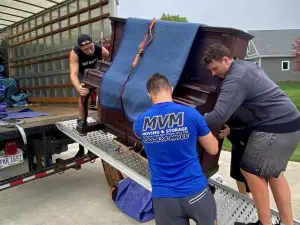How to Choose a Moving Company

Choosing a moving company requires more than just hiring an extra few sets of hands to pack and transport belongings to your new home. A reliable moving company should make the moving process stress-free, but a wrong hire could do just the opposite.
By choosing correctly, you can avoid the aggravation of the most common complaints about moving companies reported by the Better Business Bureau (BBB), which include missing or damaged items, inaccurate estimates that lead to high bills, delays in delivery, and even companies that will not release your belongings until you pay additional fees.
Before you hire a moving company, you need to know what to look for. Follow these 10 tips to ensure you get the best service for the right price.
1. Start the Process Early
You need time to consider each company you are reviewing. Feeling pressed for time can cause you to rush into hiring a company that is not the best fit. Give yourself as much time as you can to research companies and review estimates.
2. Ask Friends and Family
The most trusted source for many people when it comes to reviews and recommendations is friends and family. Ask around for anyone who has hired a moving company in your area for suggestions. They can provide guidance on companies that provided a good or bad experience and answer any questions you have about what they would have done differently.
3. Read Online Reviews
In addition to recommendations from people you know, online sources such as the BBB can tell you which companies you should work with and which ones to avoid. You can read positive and negative reviews about how the company responds to complaints. Many moving companies also have social media pages, where customers can rate and review the business.
4. Check Licenses and Accreditations
Movers should be licensed, accredited, and follow state and federal regulations. For interstate movers, ask for their U.S. Department of Transportation number and ask if they comply with motor carrier requirements. For in-state moves, your state’s consumer affairs agency can often verify their licenses.
5. Ask About Loss and Protection Coverage
Selecting the right moving company should minimize the risk of lost or damaged items, but mistakes happen even with the best companies. Ask for detailed information about cargo protection and also know what is covered by your homeowners’ insurance.
6. Get a Thorough Walk-Through
A walk-through is your chance to show the moving company everything they will need to transport, and it is how they create their estimate. To help the company offer you the most accurate estimate and to make sure there are no surprises on moving day, show them everything that will need to be moved.
7. Collect Essential Information
Learn all you can about the company during the selection process and make sure you collect the following information:
- The company’s full name and any other name they do business as
- Physical address, phone number, email, and website
- Names and contacts of references
- USDOT number
8. Ask About Fees
Avoid finding yourself in a position where you believe you have found a great price, only to end up with a final bill much higher than you expected because of fees. A good moving company will be upfront about all types of charges, but others may add fees you were not aware of when you signed.
9. Get Everything in Writing
Do not rely on verbal agreements or remembering the details of conversations. Put in writing any estimates, discounts, protection coverage, and dates to ensure each party is on the same page and to cover yourself if any disagreements arise.
10. Watch Out for Red Flags
Watch out for these common red flags for a moving company:
- No physical address
- Does not provide a written estimate
- Requests a large deposit
- Asks you to sign blank or incomplete documents
- The offer is too good to be true
Even if a company checks many of the right boxes, those are warning signs that could indicate it is not the right decision.
Moving Guides
Free, no obligation estimates for moving and storage
Our moving quotes are carefully customized to your unique moving needs and ensure the highest level of accuracy, and our relocation team has over 100 years of combined moving experience.




Locations in Ohio, Indiana, and Florida